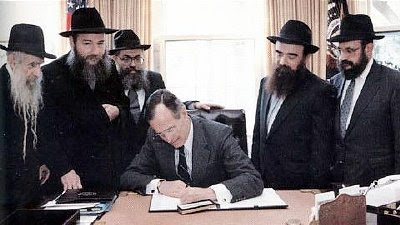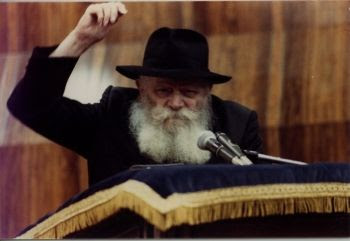Noahide law!
 |
| Public Law 102-14 was signed into law by George H. W. Bush and is cataloged at the Library of Congress |
“Whereas Congress recognizes the historical tradition of ethical values and principles which are the basis of civilized society and upon which our great Nation was founded; Whereas these ethical values and principles have been the bedrock of society from the dawn of civilization, when they were known as the Seven Noahide Laws; Whereas without these ethical values and principles the edifice of civilization stands in serious peril of returning to chaos; Whereas society is profoundly concerned with the recent weakening of these principles that has resulted in crises that beleaguer and threaten the fabric of civilized society; Whereas the justified preoccupation with these crises must not let the citizens of this Nation lose sight of their responsibility to transmit these historical ethical values from our distinguished past to the generations of the future; Whereas the Lubavitch movement has fostered and promoted these ethical values and principles throughout the world; Whereas Rabbi Menachem Mendel Schneerson, leader of the Lubavitch movement, is universally respected and revered and his eighty-ninth birthday falls on March 26, 1991; Whereas in tribute to this great spiritual leader, `the rebbe’, this, his ninetieth year will be seen as one of `education and giving’, the year in which we turn to education and charity to return the world to the moral and ethical values contained in the Seven Noahide Laws; and Whereas this will be reflected in an international scroll of honor signed by the President of the United States and other heads of state: Now, therefore, be it
Resolved by the Senate and House of Representatives of the United States of America in Congress assembled, That March 26, 1991, the start of the ninetieth year of Rabbi Menachem Schneerson, leader of the worldwide Lubavitch movement, is designated as `Education Day, U.S.A.’. The President is requested to issue a proclamation calling upon the people of the United States to observe such day with appropriate ceremonies and activities.
Speaker of the House of Representatives.
Vice President of the United States and
President of the Senate.“
– Public Law 102-14, Library of Congress Website (Please Google “Public Law 102-14, Library of Congress”)
 |
|
Public Law 102-14 also commemorates the birth of
Rabbi Menachem Mendel Schneerson
who promoted the Noahide Laws.
|
The 1906 Jewish Encyclopedia
 |
| Josh Kopelman is a reputable Jewish entrepreneur. His Kopelman Foundation is responsible for digitizing the 1906 Jewish Encyclopedia. |
What does the 1906 Jewish Encyclopedia Say About Noahide Law?
 |
| The symbol of Noahide Law is a rainbow, Noah’s rainbow, 7 colors for 7 laws |
LAWS, NOACHIAN
http://www.jewishencyclopedia.com/articles/9679-laws-noachian
The Seven Noahide Laws: Jewish Religious Laws That Apply to All
The Seven Laws.
Laws which were supposed by the Rabbis to have been binding upon mankind at large even before the revelation at Sinai, and which are still binding upon non-Jews. The term Noachian indicates the universality of these ordinances, since the whole human race was supposed to be descended from the three sons of Noah, who alone survived the Flood. Although only those laws which are found in the earlier chapters of the Pentateuch, before the record of the revelation at Sinai, should, it would seem, be binding upon all mankind, yet the Rabbis discarded some and, by hermeneutic rules or in accordance with some tradition (see Judah ha-Levi, “Cuzari,” iii. 73), introduced others which are not found there. Basing their views on the passage in Gen. ii. 16, they declared that the following six commandments were enjoined upon Adam: (1) not to worship idols; (2) not to blaspheme the name of God; (3) to establish courts of justice; (4) not to kill; (5) not to commit adultery; and (6) not to rob (Gen. R. xvi. 9, xxiv. 5; Cant. R. i. 16; comp. Seder ‘Olam Rabbah, ed. Ratner, ch. v. and notes, Wilna, 1897; Maimonides, “Yad,” Melakim, ix. 1). A seventh commandment was added after the Flood—not to eat flesh that had been cut from a living animal (Gen. ix. 4). Thus,the Talmud frequently speaks of “the seven laws of the sons of Noah,” which were regarded as obligatory upon all mankind, in contradistinction to those that were binding upon Israelites only (Tosef., ‘Ab. Zarah, ix. 4; Sanh. 56a et seq.).While many additions were made to these laws by some of the tannaim—e.g., the prohibitions against eating the blood of a living animal, against the emasculation of animals, against sorcery, against pairing animals of different species, and against grafting trees of different kinds (ib. 56b)—so that in one place thirty Noachian laws are mentioned (Ḥul. 92a; comp. Yer. ‘Ab. Zarah ii. 1), the prevalent opinion in the Talmud is that there are only seven laws which are binding upon all mankind. In another baraita (Tanna debe Menasseh) the seven Noachian prohibitions are enumerated as applying to the following: (1) idolatry, (2) adultery, (3) murder, (4) robbery, (5) eating of a limb cut from a living animal, (6) the emasculation of animals, (7) the pairing of animals of different species (Sanh. 56b).
Punishment For Breaking Any Of The Seven Laws: Death By Decapitation
Laws Before Sinai.
With regard to the other laws which are mentioned in the Book of Genesis and which were not included among the Noachian laws, as, for instance, circumcision and the prohibition against eating of the “sinew that shrank,” the Rabbis laid down the following principle: “Every law that was enjoined upon the Noachidæ and was repeated at Sinai is meant to apply both to Israelites and to non-Israelites; laws that were enjoined upon the Noachidæ and were not repeated at Sinai apply to Israelites only” (Sanh. 59a; R. Jose ben Ḥanina; comp. Bacher, “Ag. Pal. Amor.” i. 430 and note). By this principle a number of the pre-Sinaitic laws were excluded from the Noachian laws, although it required a great deal of speculative reasoning to make this principle apply to all cases (Sanh. 59b).
In the elaboration of these seven Noachian laws, and in assigning punishments for their transgression, the Rabbis are sometimes more lenient and sometimes more rigorous with Noachidæ than with Israelites. With but a few exceptions, the punishment meted out to a Noachid for the transgression of any of the seven laws is decapitation, the least painful of the four modes of execution of criminals (see Capital Punishment). The many formalities of procedure essential when the accused is an Israelite need not be observed in the case of the Noachid. The latter may be convicted on the testimony of one witness, even on that of relatives, but not on that of a woman. He need have had no warning (“hatra’ah”) from the witnesses; and a single judge may pass sentence on him (ib. 57a, b; “Yad,” l.c. ix. 14). With regard to idolatry, he can be found guilty only if he worshiped an idol in the regular form in which that particular deity is usually worshiped; while in the case of blasphemy he may be found guilty, even when he has blasphemed with one of the attributes of God’s name—an action which, if committed by an Israelite, would not be regarded as criminal (ib. 56b; see Blasphemy).
“Courts of Justice”
Procedure.
The Noachidæ are required to establish courts of justice in every city and province; and these courts are to judge the people with regard to the six laws and to warn them against the transgression of any of them (ib.; “Yad,” l.c. ix. 14, x. 11; comp. Naḥmanides on Gen. xxxiv. 13, where the opinion is expressed that these courts should judge also cases other than those coming under the head of the six laws, as, for example, larceny, assault and battery, etc.). In the case of murder, if the Noachid slay a child in its mother’s womb, or kill a person whose life is despaired of (“ṭerefah”), or if he cause the death of a person by starving him or by putting him before a lion so that he can not escape, or if he slay a man in self-defense, the Noachid is guilty of murder and must pay the death-penalty, although under the same circumstances an Israelite would not be executed (ib. 57b; “Yad,” l.c. ix. 4; comp. “Kesef Mishneh,” ad loc.).Only six cases of what would ordinarily be illicit connection are forbidden to the Noachid: (1) with mother; (2) with father’s wife, even after the father’s death; (3) with a married woman, whether married to a Jew or to a non-Jew; (4) with sister by the same mother; (5) pederasty; (6) bestiality. In these cases also there are differences in the punishment inflicted, dependent upon whether the offenses are committed by a Noachid or by an Israelite (see “Yad,” l.c. ix. 5-8). The Noachid is punished with decapitation for all kinds of robbery, whether from a Jew or from a non-Jew, even though the article stolen is worth less than a peruṭah (the smallest Palestinian coin, for less than which no case can be instituted against an Israelite). The Noachid is executed also if he eat of a limb cut from a living animal, even though the quantity consumed be less than the size of an olive (the minimum portion for the eating of which an Israelite may be punished; “Yad,” l.c. ix. 9-13).
Special Exceptions.
The Noachid is free from punishment if he commits a sin unwittingly; ignorance of the Law, however, does not excuse him. If he commits a sin under duress, even one for which an Israelite is obliged to undergo martyrdom rather than transgress (e.g., idolatry, adultery, or murder), he is not liable to punishment (Mak. 9a; Sanh. 74b; “Yad,” l.c. x. 1, 2; comp. “Leḥem Mishneh” and “Kesef Mishneh,” ad loc.). A Noachid who slays another Noachid, or worships idols, or blasphemes, or has illicit connection with the wife of another Noachid, and then becomes a proselyte, is free from punishment. If, however, he has killed an Israeli (Sanh. 71b; “Yad,” l.c. x. 4).
A Noachid who wishes to observe any of the laws of the Torah is not prevented from doing so. With regard to the prohibition against a Noachid studying the Law or observing the Sabbath, see Gentile in Relation to Jews.
He who observed the seven Noachian laws was regarded as a domiciled alien (, ‘Ab. Zarah 64b; see Proselyte), as one of the pious of the Gentiles, and was assured of a portion in the world to come (Tosef., Sanh. xiii. 1; Sanh. 105a; comp. ib. 91b; “Yad,” l.c. viii. 11). In Talmudic times the non-Jews of Babylon were apparently sunk in the grossest immorality, so that ‘Ula, one of the earlierBabylonian amoraim, complains that out of the thirty laws (see above) which the Noachidæ accept they observe only three—they do not write a marriage contract (“ketubah”) for pederasty; they do not sell human flesh in their shops; and they show respect for the Torah (Ḥul. 92b).
In the Messianic age the Noachidæ will accept all the laws of the Torah, although later they will again reject them (Yer. ‘Ab. Zarah ii. 1).
Bibliography:
Hamburger, R. B. T. ii., s.v. Noachiden;
Hirschfeld, Pflichten und Gesetze der Noachiden, in Kobak’s Jeschurun, iv. 1-19;
Levinsohn, Zerubbabel, ii. 74-87, Warsaw, 1878;
Weber, System der Altsynag. Paläst. Theologie, § 56, Leipsic, 1880;
Zweifel, Sanegor, pp. 269 et seq., Warsaw, 1894.
[A] “The Jewish Encyclopedia”. New York Times. August 16, 1902. Retrieved March 17, 2014.
[B] http://www.kopelman.org/mission.html
[C] Laws, Noachian. 1906 Jewish Encyclopedia.
http://www.jewishencyclopedia.com/articles/9679-laws-noachian
 RSS Feed
RSS Feed















 February 1st, 2021
February 1st, 2021  Awake Goy
Awake Goy  Posted in
Posted in  Tags:
Tags: 














Outstanding essay! I actually made a search query for this public law 102-14 trying to verify if the actual Noahide laws were what had been signed into law or if it was just the “Education Day” being what became recognized as a law. This article didn’t definitively answer that but it’s author shared all of what scares the crap out of me about them having a place in law! I learned so much & thoroughly enjoyed this expertly written piece. I learned so much! I am so grateful to this author for their efforts and extraordinary results! Thank You. Thank You!!!